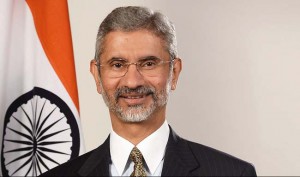POKHARA (Nepal): Pushing for enhancing regional connectivity, India has underlined its unflagging commitment to pursue “neighbourhood first” policy with renewed vigour. India has said that there is scope for further rationalisation of the processes and the time has come for the group to take stock of past decisions and initiatives on which there has been no movement.
During his statement at the 42nd SAARC Standing Committee meeting in Pokhara, India’s Foreign Secretary S. Jaishankar said: “As far as India is concerned, we are pursuing with renewed vigour our “neighbourhood first” policy which also translates into priority for our SAARC initiatives. We are systematically pursuing the important ideas flagged by my Prime Minister at the last Summit. These are important not because they were made by India but because they have the potential to help us achieve our goal of greater connectivity and integration.”
“We are firmly of the belief that a peaceful, secure and prosperous neighbourhood will yield rich dividends for all of us,” he said.
Connectivity
The SAARC countries have been focusing on enhancing connectivity in the region. Asserting that connectivity holds the key for prosperity and development, Mr Jaishankar said that this will shape the destinies of all countries of South Asia. The SAARC railway agreement and Motor Vehicles agreement to enhance connectivity did not make any progress at the meeting.
Insisting that the SAARC members should speed up the signing of the pacts, Mr Jaishankar said: “Yet, the pace of regional cooperation as a collective endeavour needs to be hastened, especially in areas that are central to the development agenda of Saarc. In this context, I urge that we sign, at an early date, the Saarc Motor Vehicles Agreement and Saarc Railways Agreement.”
Peaceful neighbourhood
India emphasised on the importance of a secure and peaceful neighbourhood. Speaking about some of the important pacts made, Mr Jaishankar spoke about the agreements on Convention on Terrorism, Narcotic Drugs and on Human Trafficking. Elaborating on the challenges, Mr Jaishankar said:“Another major challenge that we face today is that of circulation of fake currency notes. This is closely interlinked with the problems of money-laundering, drug trafficking and human trafficking as well as financing of terrorism. It would, therefore, be in the interest of the people of our region for us to collaborate at the SAARC level to tackle this matter.”
Author Profile
- India Writes Network (www.indiawrites.org) is an emerging think tank and a media-publishing company focused on international affairs & the India Story. Centre for Global India Insights is the research arm of India Writes Network. To subscribe to India and the World, write to editor@indiawrites.org. A venture of TGII Media Private Limited, a leading media, publishing and consultancy company, IWN has carved a niche for balanced and exhaustive reporting and analysis of international affairs. Eminent personalities, politicians, diplomats, authors, strategy gurus and news-makers have contributed to India Writes Network, as also “India and the World,” a magazine focused on global affairs.
Latest entries
 DiplomacyJanuary 5, 2026India walks diplomatic tightrope over US operation in Venezuela
DiplomacyJanuary 5, 2026India walks diplomatic tightrope over US operation in Venezuela India and the WorldNovember 26, 2025G20@20: Africa’s Moment – The Once and Future World Order
India and the WorldNovember 26, 2025G20@20: Africa’s Moment – The Once and Future World Order DiplomacyOctober 4, 2025UNGA Resolution 2758 Must Not Be Distorted, One-China Principle Brooks No Challenge
DiplomacyOctober 4, 2025UNGA Resolution 2758 Must Not Be Distorted, One-China Principle Brooks No Challenge India and the WorldJuly 26, 2025MPs, diplomats laud Operation Sindoor, call for national unity to combat Pakistan-sponsored terror
India and the WorldJuly 26, 2025MPs, diplomats laud Operation Sindoor, call for national unity to combat Pakistan-sponsored terror








